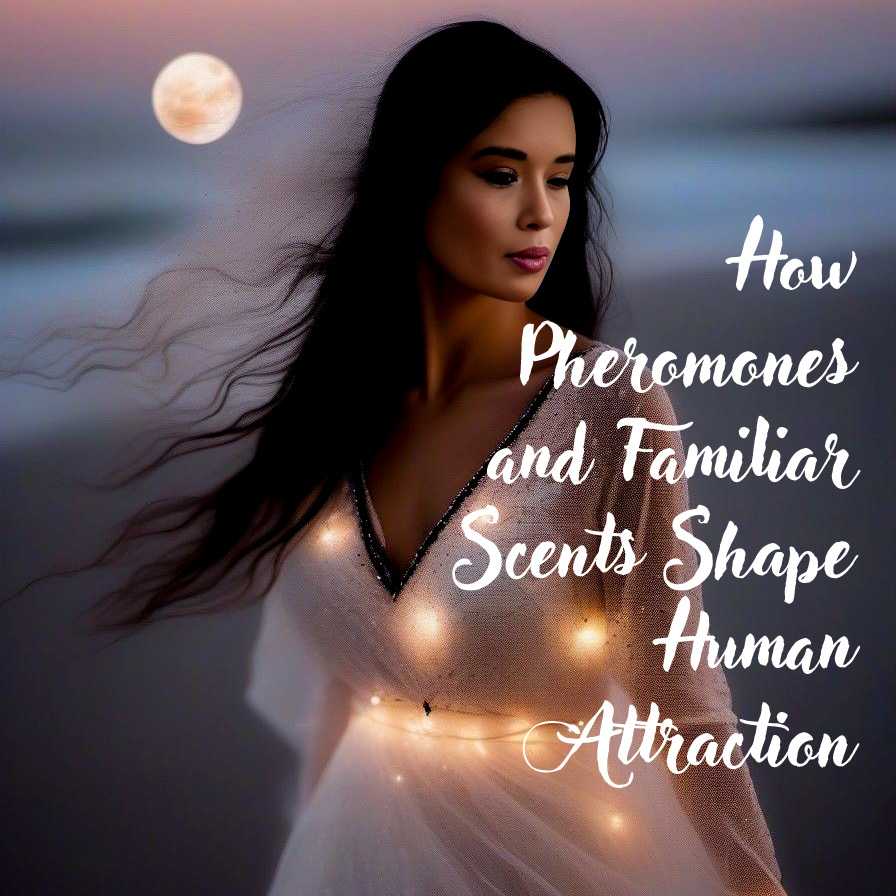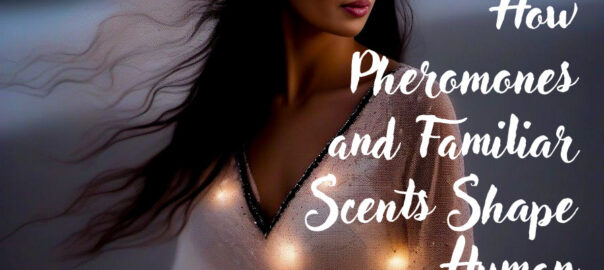Ever found yourself drawn to someone who didn’t quite fit your ideal, even though everything about them seemed perfectly fine? Perhaps he was considerate, dependable, and genuinely a nice guy, yet something in the relationship felt off. You might have questioned why you felt so attracted to someone who didn’t match your usual preferences, or why the connection didn’t seem as strong despite all his positive qualities. It’s a common experience, leaving many to wonder why their feelings don’t always align with what they think they should want.
This mismatch between our expectations and actual attractions can be perplexing. We often try to rationalize it, wondering if we’re too picky or if we’re overlooking something important. But what if the reasons behind these unexpected attractions or lack thereof are rooted in something beyond our conscious awareness? What if the forces influencing our romantic inclinations are more primal than we realize?
The answer may lie in the world of pheromones—those nearly imperceptible chemical signals that our bodies release, which can significantly affect who we find attractive. Pheromones work on a subconscious level, shaping our emotions and behaviors in ways that can draw us to or push us away from potential partners. By understanding how pheromones influence attraction, we can begin to unravel why we sometimes find ourselves intrigued by someone who doesn’t fit our usual “type” or why we might struggle to feel a spark with someone who seems like an ideal match on paper.

The Hidden Power of Pheromones
Pheromones are chemical signals that our bodies produce and release into the environment, influencing the behavior and emotions of those around us. In the realm of human attraction, pheromones can subtly but profoundly affect who we find appealing. Even when someone seems to have all the qualities of a “good guy”—kindness, respectfulness, reliability—pheromones can tip the scales, making us feel a powerful pull toward someone else who might not be an obvious choice.
Biological Compatibility and Pheromones
One of the most fascinating aspects of pheromones is their ability to signal biological compatibility. Research suggests that we are often subconsciously attracted to individuals whose immune system genes are different from our own. This genetic diversity is advantageous because it can lead to healthier offspring with stronger immune systems.
Imagine meeting a guy who seems perfect on paper. He’s sweet, attentive, and everything you’ve been looking for. Yet, there’s something about him that doesn’t quite spark that deep, instinctual attraction. It could be that your pheromones aren’t signaling a strong genetic match, which can influence your level of interest, regardless of how “good” he is.

The Subconscious Influence of Scent
Our sense of smell is closely linked to the brain’s limbic system, which is involved in emotion and memory. This connection means that pheromones can trigger emotional responses without us even realizing it. You might find yourself inexplicably drawn to someone whose pheromones make you feel comfortable, excited, or even aroused, while another person with equally good qualities doesn’t elicit the same reaction.
This subconscious influence can explain why you might be attracted to someone who doesn’t fit your usual “type.” Their pheromones might be sending signals that align perfectly with your body’s subconscious criteria for a mate, making them irresistible, even if your conscious mind isn’t fully on board.
The Role of Familiar Scents
It’s also possible that a guy’s scent might remind you of the scent of your mother or father, and this could profoundly influence your attraction to him. Scent is closely tied to memory and emotion, particularly to early life experiences. If a guy’s scent resembles that of your parents, it might evoke feelings of comfort, safety, and familiarity, which are deeply ingrained from your childhood. This connection could make you feel more at ease and subconsciously more attracted to him, even if you’re not fully aware of the reasons why.
Scent preferences are often shaped by our earliest experiences, and the primary caregivers in our lives—like our mother and father—play a significant role in this. The familiar scent could be associated with care, love, and security, leading you to feel a strong, almost instinctual connection to someone whose scent triggers these associations. This phenomenon might even explain why certain scents make you feel more connected to a person or why you’re drawn to them despite other mismatches.

Chemistry: More Than Just a Buzzword
When people talk about “chemistry” in a relationship, they’re often referring to that elusive, inexplicable connection that makes someone feel right for us. Pheromones are believed to be a key ingredient in this mysterious mix. Even if a guy seems ideal in every other way, if the pheromonal chemistry isn’t there, you might not feel that intense connection.
Conversely, you might feel an undeniable spark with someone who doesn’t seem like a perfect match otherwise. This “chemistry” can sometimes lead you into relationships that don’t align with your long-term goals or values because the initial attraction driven by pheromones is so strong.
The Complexity of Human Attraction
Human attraction is complex, influenced by a web of factors, including social, cultural, psychological, and biological elements. Pheromones are just one piece of this intricate puzzle, but they can have a surprisingly powerful impact on who we are drawn to and why.
It’s important to recognize that while pheromones can influence attraction, they’re not the only factor to consider in choosing a partner. A person’s character, values, and compatibility with your lifestyle and goals are all crucial aspects of a healthy relationship. However, understanding the role of pheromones can help explain those moments when your heart pulls you in a direction your head doesn’t quite understand.

So, the next time you find yourself irresistibly drawn to someone who doesn’t seem like your type or questioning why a seemingly perfect match isn’t sparking your interest, remember the hidden power of pheromones. These chemical signals might be guiding your attraction on a level that’s beyond your conscious control. Whether it’s the subtle scent of biological compatibility or the comforting familiarity of a scent that reminds you of your mother or father, pheromones play a significant role in shaping our attractions. While it’s important to be aware of their influence, it’s equally vital to balance this biological instinct with the practical considerations that make for lasting, fulfilling relationships.
References:
- Grammer, K., Fink, B., & Neave, N. (2005). Human pheromones and sexual attraction. European Journal of Obstetrics & Gynecology and Reproductive Biology, 118(2), 135-142. • This study explores the role of pheromones in sexual attraction and how they influence human mate selection on a subconscious level.
- Wedekind, C., Seebeck, T., Bettens, F., & Paepke, A. J. (1995). MHC-dependent mate preferences in humans. Proceedings of the Royal Society of London. Series B: Biological Sciences, 260(1359), 245-249.
• This seminal study investigates how humans are attracted to the scent of potential mates with differing MHC (Major Histocompatibility Complex) genes, which plays a role in immune system diversity. - Havlíček, J., & Roberts, S. C. (2009). MHC-correlated mate choice in humans: A review. Psychoneuroendocrinology, 34(4), 497-512.
• This review provides a comprehensive overview of research on MHC-related mate preferences and the potential role of pheromones in human attraction. - Doty, R. L. (2010). The Great Pheromone Myth. Johns Hopkins University Press.
• This book critically examines the concept of pheromones in humans and challenges some of the myths surrounding their role in human behavior and attraction. - Herz, R. S., & Cahill, E. D. (1997). Differential use of sensory information in sexual behavior as a function of gender. Human Nature, 8(3), 275-286.
• This study discusses how different sensory cues, including scent, are used by men and women in mate selection, highlighting the complex role of pheromones. - McClintock, M. K. (1971). Menstrual synchrony and suppression. Nature, 229(5282), 244-245.
• This landmark study first proposed the idea of pheromones influencing human behavior, specifically how women’s menstrual cycles can synchronize when living closely together, suggesting a form of pheromonal communication. - Wilson, M. D., & Havens, B. (2017). The role of odor and scent in the human experience: Implications for human mate selection. Chemical Senses, 42(8), 789-798.
• This article delves into how scent influences human experiences and behaviors, including mate selection, providing insights into the interplay between scent, memory, and attraction.
